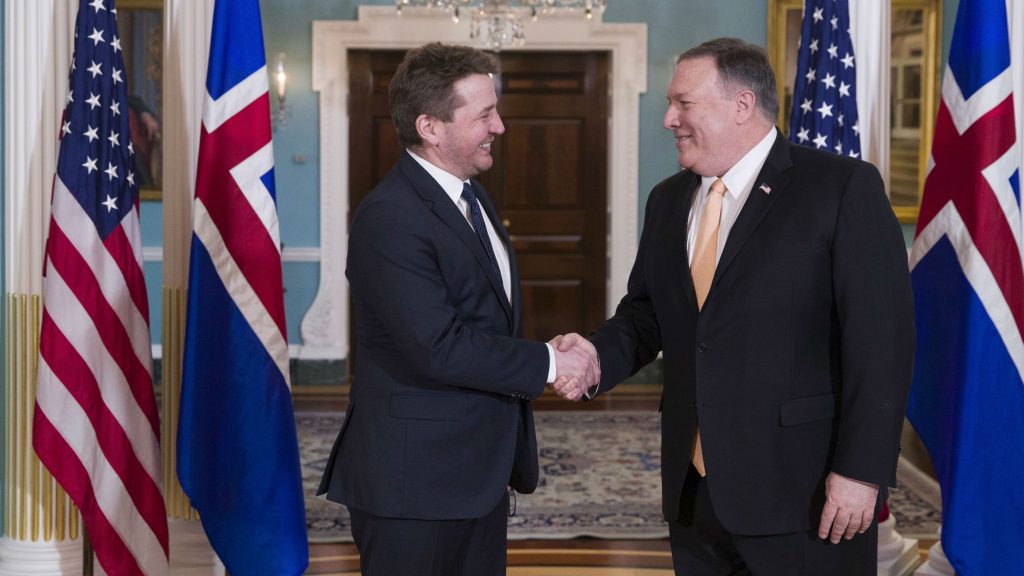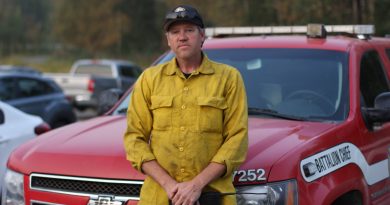Iceland, U.S. FMs talk Arctic security, defence cooperation at Washington meeting

Iceland – U.S. cooperation in Arctic security and defence issues was among the key issues discussed by the the two country’s foreign ministers at a meeting in Washington, D.C. this week.
Foreign Minister Gudlaugur Thor Thordarson and U.S. Secretary of State Mike Pompeo met on Monday.
It was the first bilateral meeting for the two ministers since Pompeo was appointed last year.
“The changing strategic environment in the North Atlantic and the Arctic reinforces the importance of the longstanding security relationship between the United States and Iceland,” said the two ministers in a joint statement issued by the U.S. Department of State on Monday.
“Accordingly, we will enhance our consultations and cooperation within NATO and in maintaining the bilateral Defense Agreement.”
Reaffirming cooperation in North Atlantic
Iceland does not have a standing army. The United States has committed to Iceland’s defense on behalf of NATO since 1951’s bilateral defence agreement.
In 2016, the two countries signed a Joint Declaration on Security Cooperation where the United States reaffirmed its commitment to Iceland’s defence, and Iceland agreed to continue allowing the U.S. and NATO to use Icelandic facilities “in order to reinforce mutual security.”
“Iceland and the United States have a longstanding and solid relationship, with regard to both security and defence as well as trade,” said Thordarson in a news release from Iceland’s Ministry of Foreign Affairs on Tuesday.
“The US is our single biggest trading partner and US tourists are the largest single nationality that visits Iceland. Moreover, we have many mutual interests in the High North. This meeting with Secretary Pompeo indicated clearly the will of the US government to strengthen the relationship between the two countries even further.”
Arctic Council
Both the United States and Iceland are members of the Arctic Council, an international forum made up of the world’s eight circumpolar nations and six Arctic Indigenous groups who work together on environmental and sustainable development in the North.
Year formed: 1996
Arctic Council Members: Canada, Denmark (Greenland), Finland, Iceland, Norway, Sweden, Russia, United States
Permanent Participants: Aleut International Association, Arctic Athabaskan Council, Gwich’in Council International, Inuit Circumpolar Council, Russian Association of Indigenous Peoples of the North, Saami Council
Current Chair: Finland (2017-2019)
Iceland assumes the rotating two-year chairmanship from Finland in May.
Iceland’s preliminary chairmanship program “Together Towards a Sustainable Arctic” was revealed in November. Its outlined priorities include the Arctic marine environment, climate and green energy solutions, the people of the Arctic and strengthening the Arctic Council.
In the joint statement Monday, Iceland pledged to “… work closely with the United States and other member states in furthering cooperation in the region.”
Write to Eilís Quinn at eilis.quinn(at)cbc.ca
Related stories from around the North:
Canada: Canadian military to build multi-million dollar facility in Northern city, CBC News
Finland: Finland to host major war games in 2021, Yle News
Greenland: Controversy over Greenland airports shows China still unwelcome in the Arctic, Cryopolitics blog
Norway: NATO’s Arctic dilemma, Radio Canada International
Iceland: Alaska drilling, China, and the Arctic Council handover to Iceland : Northern news to watch for in 2019, Eye on the Arctic
Russia: Troops in Russia’s High Arctic undergo “military-patriotic” training, The Independent Barents Observer
Sweden: Swedish military wants to double in size, Radio Sweden
United States: New symposium brings U.S. military’s attention to the Arctic, Alaska Public Media



